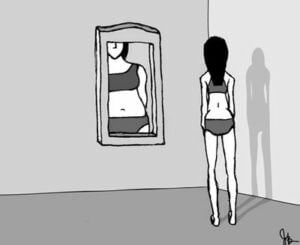Perhaps the best way for me to state it is like this: If my grandmothers were ugly, they didn’t know it.
I know that the statement sounds a bit crude and harsh, but I don’t remember either of them being terribly concerned or obsessed about how they looked. I don’t remember the other people in their lives (family members and friends) being concerned about how my grandmothers looked either. I don’t think that it’s any coincidence that my grandmothers’ generation didn’t grow up with nor did they have to live with the 24/7 barrage of marketing, media, and social media images that in today’s world have become the standards for comparison and body-image standards to which people strive.
Fast-forward to contemporary culture. Can any of you name a person who doesn’t struggle with some level of body image care, concern, or obsession? Let me make it even harder. . . can any of you name a young person who doesn’t feel the pressure to obsess?

This newer category of sub-diagnoses is called EDNOS – eating disorders not otherwise specified. It’s growing category that I’m sure will continue to grow. In an effort to keep you informed, here are some of these sub-diagnoses:
- Orthorexia – This is a fixation with healthy or “righteous” eating. These are the folks who will only put organic foods in their bodies. They will eliminate entire food groups. They will refuse to eat anything that isn’t “pure” in quality. The motivation here is a fear of bad health, a desire to control everything they eat. Orthorexia can lead to malnourishment.
- Pregorexia – This is the extreme dieting some resort to during pregnancy in an effort to not put on the normal 25 to 35 pounds of extra pregnancy weight. Rather than “eating for two,” these women eat with an obsession to be sure the one – themselves – stays skinny. Rooted in the social pressure to look thin during and after pregnancy, Pregorexia is risky for moms as it can lead to high blood pressure, anemia, and depression. Risks to the baby include miscarriage and birth defects.
- Binge Eating – This is the complusive overeating people resort to to deal with stress and emotional problems. The difference between this type of binge and the Bulimic binge is that they don’t reverse the binge by vomiting.
- Anorexia Athletica – I remember hearing this called Hypergymnasia several years ago. With this addiction to exercise, people work out above and beyond what’s helpful and healthy. Gym time begins to interfere with their jobs and relationships. Fatal cardiac problems and depression can result.
- Drunkorexia – This occurs when someone decides to restrict their caloric intake from food so that they can drink the calories in alcohol, usually at times when they are planning to binge drink. A study at the University of Missouri found that almost 30 percent of female college students exhibit drunkorexic behavior. They think they will not gain weight and that they will get drunk faster. Chances for alcohol poisoning, drunken sexual behavior, and heart/liver diseases are risks associated with Drunkorexia.
Why did I blog on this today? To raise your awareness. It’s something else we need to understand and address with the kids – and adults – we know and love. Contrary to the cultural message pounded home 24/7 that “you are what you look like,” our identity can and must be found in who we are people made in the image of God. . . and thereby filled to overflowing with value and worth.
The only issue I have with this article is that it makes it look like the root cause is appearance/vanity. More complex than that.
https://crosswindscounseling.org/blog/eating-disorders-root-causes/